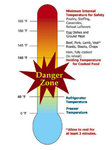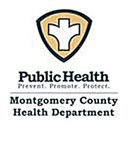

Nothing beats cooking out by the pool on a hot summer day. The warm weather is a great opportunity to spend time outdoors with family and friends but it is also the perfect environment for foodborne bacteria to thrive. Most bacteria grow in temperatures that are similar to the average human body temperature, so it is important to be extra cautious especially when the weather reaches 80 degrees or higher.
A good point to remember before bringing food to a cookout is that, hot foods should stay hot, and cold foods should stay cold. Both hot food and cold food should not sit out longer than two hours, or one hour if the temperature is above 90 degrees. If foods sit out longer than the recommended time, you should properly get rid of it. You cannot see, smell or taste bacteria that causes illness so when in doubt, throw it out. According to the FDA, any temperature that is between 40-140 degrees is said to be in the “danger zone” because the chances of bacteria growth increases rapidly.
When transporting foods to a cookout, the main thing to keep in mind is to not cross contaminate foods. Warm and cold food should be kept in separate well-insulated containers until they are served. A helpful tip is to store drinks and perishable foods items like pasta salad in separate coolers. This keeps food at the proper temperature by preventing the cooler being opened every time someone grabs a drink.
Before bringing food to grill out with, be sure to keep raw meat, poultry, and seafood securely wrapped. This keeps their juices from contaminating prepared/cooked foods or foods that will be eaten raw, such as fruits and vegetables. As far as produce, don’t forget to rinse it off before serving due to the possibility bacteria such as E.coli. Once produce has been cut, it needs to be stored in a covered container because the produce is now exposed to potential bacteria. Besides food borne bacteria being a problem when eating outdoors, pools, ponds and lakes bring along more types bacteria.
Bodies of water have the potential to grow water borne bacteria that can cause illnesses. Be even more cautious when handling food around water because wet hands could easily mix contaminated water with food. Wet hands are more likely to spread disease so be sure to dry hands before reaching for food.
While pool water may seem safer than water from ponds and lakes, pool water still could have bacteria. The chemicals used in pools like chlorine are mostly effective; however, they are not perfect. Some bacteria are capable of living days in a pool before it is killed.
Illnesses from foodborne and waterborne bacteria are more prevalent in the summer because more people are eating and swimming outside. The best steps to combat these issues is being aware of the potential threats by remembering to wash and dry hands, keeping foods at the right temperatures, and to not cross contaminate.
If an illness is contracted after a cookout or by a body of water, contact your primary care physician. If you have any questions, contact your local health department at
765-363-6440.
Sam Marksberry, Wabash College ‘21, is an intern with the Montgomery County Health Department.